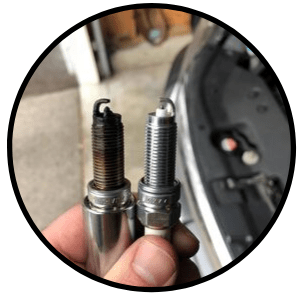If you’ve found oil on your spark plug, it is a cause for concern. It doesn’t necessarily indicate a disaster. Oil on the plugs is usually caused by a bad valve cover gasket or O-Ring (overhead cam engines). There are other causes as well.
Any gas engine needs three things in order to achieve ignition. It needs air, fuel, and spark. When it doesn’t get the optimal proportion of all three, it is not perform well.
The ignition system takes care of the spark part of the equation. The spark plugs are the final stop in the ignition system’s process. An oily spark plug can cause the spark part of the equation to be seriously compromised.
If you do end up with oil on your spark plugs, you’re going to need to consider replacing them.
Oil on Spark Plug Symptoms
When there is oil on the spark plug, it’s going to make combustion in its cylinder less efficient.
- Check Engine Light– The service engine soon light will often be on. This is good news, since you can use the trouble codes it throws to diagnose the problem.
- Misfire– The number one indicator that there is oil on the spark plug is a misfire. Your check engine light could be on. If it is, get an OBDII scanner. It’ll likely show a P030X trouble code, where the X represents that cylinder number in the firing order. Or, you’ll get P0300 if you have a random cylinder misfire. Eventually, if the engine misfires enough, it can lead to a backfire.
- Decreased Fuel Mileage– With the fuel burning less efficiently, mileage will suffer. It may not be a lot at first, but it will get worse as the plug gets worse.
- Catalytic Converter Damage– Fuel that is not properly combusted will leave behind gasses that can and will hurt the catalytic converter. If the service engine soon light is flashing, this indicates that the ECM reads that this could be happening.
- Blue Exhaust Smoke– When a spark plug is burning oil, there will be a blue tint to the exhaust. This is coming from the burn oil.
Oil on Spark Plug Causes
Most of the time, oil on your spark plugs is going to be caused by a bad O-ring seal on the plug itself or a bad valve cover gasket. Here are the most common symptoms of oil on spark plugs:
Bad Valve Cover Gasket– Oil is pumped from the oil pan up through the cylinder heads. The valve cover gaskets seal the valve covers, which are on top of the head. They are there for you to have access to the head. As they age, they can dry out and go bad. When this happens oil can leak out of the engine and into the spark plug wells.
Valve Guides– As an engine wears throughout its life, the valve guides can go bad. When this happens, oil can get directly into the combustion chamber. While, the combustion process can burn off a lot of this oil, eventually it’ll hurt the plug and it’ll get oily.
O-Ring– On most overhead cam designs, there is an O-Ring that protects the spark plug from oil from above. If this ring dries out or fails over time, it will begin to allow oil to drip onto the plug.
Piston Rings– Piston rings surround your piston and fill the already tiny space between the piston and the cylinder wall. This keeps oil from entering the combustion chamber. If these rings begin to fail, it can lead to oil on the spark plugs.
Bad Piston– If the piston runs too long hot, it can develop a crack. This crack will let oil through. When this is the case, oil on the spark plugs is almost never the only indication of the problem. There is should also be a lack of engine power and some truly horrible knocking sounds.
Oil on Spark Plug Thread
Oil on the spark plug threads is typically caused by a leak from the valve cover gaskets onto the plugs themselves.
Conclusion
Getting oil on the spark plugs is always a sign of a problem with something other than the plug itself. Although, enough oil can ruin a plug anyway. Good luck diagnosing your issue. Please feel free to leave a comment if there is anything that you would like to add.


